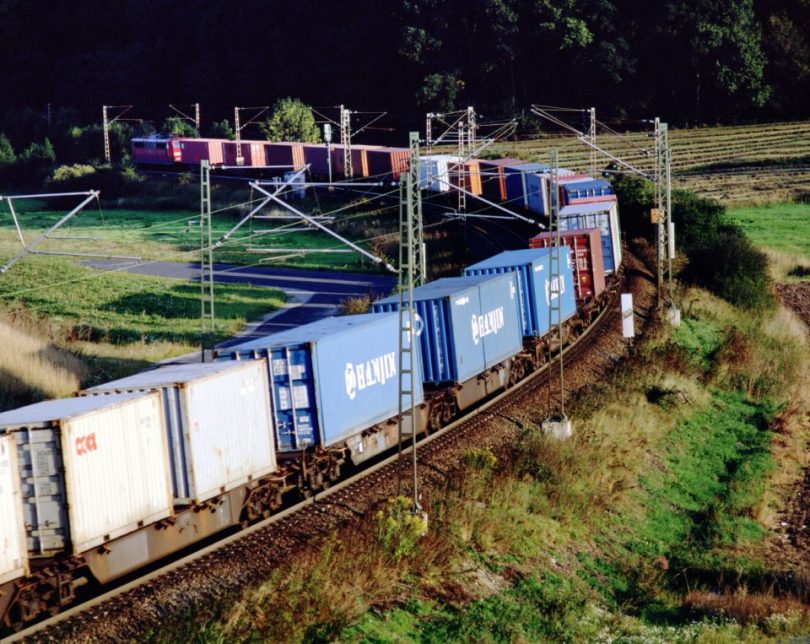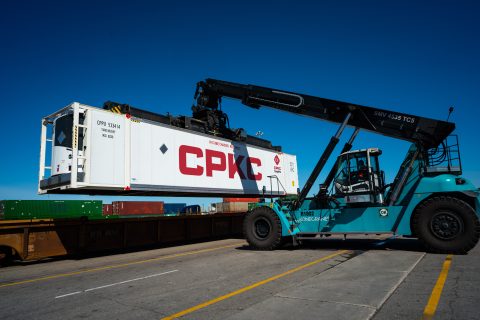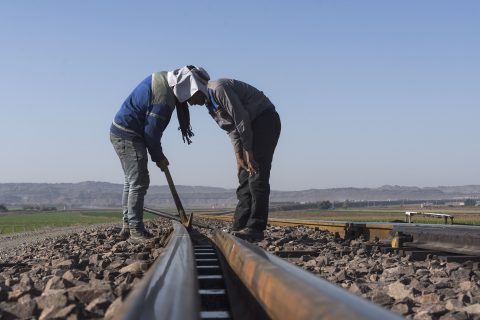Germany speeds up 740-metre freight train network upgrades

Germany’s rail freight operators have welcomed the government’s planned acceleration of infrastructure upgrades to enable 740-metre long freight trains to operate across the network.
The Federal Transport Ministry has given a positive assessment of measures necessary for modernising the network, and said it would be making these projects a priority. This reaffirms last year’s Rail Freight Masterplan, which highlighted the construction of new or lengthening of existing passing loops and relocation of signals along rail freight corridors.
Upgrades
The heads of Germany’s largest freight train operators are now hoping these upgrades will be implemented as quickly as possible, and have again called on politicians to increase the pace of infrastructure improvements.
DB Cargo, SBB Cargo International, the Havelland Railway, the Port of Hamburg Railway and Lokomotion Rail all say there is great potential for moving freight onto rail. However currently only 11 per cent of trains in Germany can operate with the standard European 740-metre length, and this is often because of only minor network limitations, according to the German Pro Rail Alliance (Allianz pro Scheine). The Transport Ministry has estimated that it will cost around 405 million Euros for the upgrades that will remove existing bottlenecks.
Competitiveness
Welcoming the government’s latest announcement, Roland Bosch, Chairman of the Board of DB Cargo, said: “For the train operating companies, train length is an important productivity leverage, and this will be greatly improved. With a standard length of 740-metres, rail operators can increase their competitiveness vis à vis road freight transport, on both price and quality.”
Harald Kreft, Head of Railway Infrastructure at the Port of Hamburg, is similarly pleased that politicians are giving priority to the 740-metre train issue: “An upgraded network that allows unrestricted access to 740-metre trains will, from day one, considerably boost the efficiency of the trains operating between Hamburg’s port and its hinterland. Capacity utilisation on our trains is already high.”
Productivity boost
The introduction of these longer trains would also, added Kreft, result in ‘very appreciable efficiency gains’: “For combined transport, this will mean between and eight and twelve containers more per train. This additional productivity boost will benefit all participants in the logistics chain, as well as – last but not least – the environment.”
Ludolf Kerkeling, Chairman of the Berlin-based private operator Havelland Railway (HVLE), emphasised the relationship between efficiency increases in the rail freight sector and the climate protection targets set by politicians: “I am exceptionally happy that the positive decision on 740-metre trains, which I was expecting, has now been taken. This is an important step towards increasing efficiency and the resulting strengthening of rail freight transport. However, at the same time I am calling on politicians to also address the other points contained in the Ministry’s Blueprint for Transport, developed jointly with the railways, and to implement them quickly. This will shift transport onto the environmentally-friendly railways and put the transport sector into a position to achieve its climate protection targets.”
Bottlenecks
Michail Stahlhut, chairman of SBB Cargo International, believes the bottlenecks on the German network have become an impediment to rail freight transport in Europe as a whole and that upgrades to expand the 740-metre network are a vital first step: “With the 740-metre network, we will achieve a significant boost in efficiency in European rail freight transport. However, we still have not reached an optimum. The interruptions at Rastatt have shown us that we need to reconsider the situation. Our infrastructures need to urgently become more international. This will only happen if the infrastructure is managed centrally. Rail freight transport is European and the management of the infrastructure must also become European. We are calling for interoperability along the entire corridor.”
The German Rail Freight Masterplan also said the operation of freight trains even longer than 740 metres was also being studied, including the feasibility of trains longer than 1,000 metres. Results of these studies are due by the end of 2018, though any implementation would not be until midway through the next parliamentary term. These proposals are supported by Armin Riedl, Managing Director of trans-Alpine freight specialists Lokomotion Rail, who regards the 740-metre network as a step towards considerably longer trains. He explained: “Expanding the 740-metre network is absolutely fundamental to the future sustainability of rail freight transport. Only on the basis of these infrastructure upgrades can we really utilise the strengths of the railway system, namely operating long and heavy trains over long distances.
Infrastructure
“In order to amplify this effect, the standard train length of 740 metres in Germany should be a model for upgrading the European 740-metre network. Going forward, this discussion can only be a step towards further increases in train length to 900 metres or more. From a technical point of view, wagons and locomotives are capable of this without any problems. It is only the infrastructure that hinders us from realising these efficiency gains,” added Riedl.





